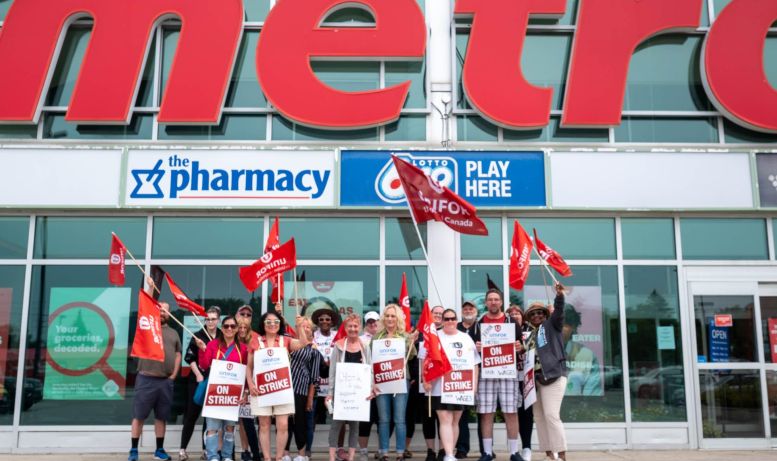Metro grocery workers in Greater Toronto, members of Unifor, voted overwhelmingly to strike in 27 stores, effective July 29, after rejecting a tentative deal reached by the union bargaining committee and the company. Since then, some 3,700 workers have withheld their labour and have been on the picket lines to force the company and their union to come back with a better deal.
Metro recently reported record profits of $346.7 million in the quarter ending July 1, a 26 percent increase from $275 million the previous year. At the time of writing, the two sides aren’t even at the bargaining table. This past weekend, Metro criticized Unifor Local 414 for turning down an invitation to restart negotiations. Unifor, meanwhile, gave a clear reason for not sitting down with the employer — its unwillingness to improve upon the rejected offer. “Front-line grocery workers have been clear about their expectations, and what the company presented doesn’t come close to addressing the issues,” wrote Local 414 President Gord Currie.
This could be a long-drawn-out strike. The chance of back-to-work legislation is minimal given that the present strike affects only one part of one grocery chain, so it doesn’t have the capacity to hurt the profits of the wider capitalist class, as happened with the Longshore strike in BC. Arbitration seems equally unlikely as it requires the agreement of both sides for it to go ahead. Metro workers undoubtedly have the public’s support. But, to succeed, they’ll need more than that. Labour action in other areas of the grocery sector as well as solidarity actions from the Ontario labour movement would be a good start.
Socialist Alternative recently visited a picket line at Erin Mills Parkway in Mississauga and asked workers to share their perspectives. Interviews have been edited for length and clarity and some names have been withheld at the interviewee’s request.
Shelly
“I’ve been with the company almost 50 years and this is my first strike ever. During the pandemic, we were here every single day. We did as much as we could to make sure that products were on the shelf, that the customers were able to come in and purchase something.
“I mean, we come in, no toilet paper, no Kleenex, no nothing. Aisles were completely empty. So, we worked, we were exhausted by the time we finished our night shift, we did all that. We were heroes. We got extra pay, which we had to really fight for. And as soon as the pandemic was knocked off, they took it away. It’s almost as if the money is being made by whoever, and they want to keep it all.
“We see the prices go up every week. It’s every day. Meanwhile they’re sitting in their $10 million cottages driving their $100,000 cars. They don’t care. How can we be a hero here for two years or a year and a half and then be scum the next?’’
Rick
“Yeah, I’ve been here since 2014. The rate of pay increases so slowly and so small that it doesn’t keep up with inflation. This government is killing this country. Prices have doubled. We’ve done our best. We thought we were heroes during the pandemic. We had customers coming in complimenting us. But then you also have to deal with the ones that are flipping out on you, cursing at you, calling you the worst thing humanly possible because we didn’t have enough grapes on the table for them.
“It’s disheartening, it really is. All we’re asking from the company is to give a little back to us. We give our blood, sweat and tears to doing a good job. We’re polite to people every day. We do our best to help people, to show them where their products are, to listen to their individual problems.
“And unfortunately, the way this country is going with this federal government, a lot of us live paycheque to paycheque and these big corporations realize that. So, they draw a line in the sand thinking we’re not going to jump across, well bite my ass, we’re jumping across. Because if we don’t today and in four years, what are they going to do? In eight years? What are they going to do if we don’t stand up now? There’s no hope for us. We appreciate all the public support we get. And you know, we’re going to stick to our guns.”
Ron
“Twenty years [I’ve worked here]. I came here everyday during the pandemic and ended up in the hospital. I got COVID and I ended up in hospital in the emergency ward. And this is the thanks they give us? A dollar and five a year and then $0.90? It’s disgusting. Really is.
“I run a department and I see the prices. I used to change prices once a month, once every six weeks. Now it’s every week. I’m changing prices up, up, up, up. Customers see it. We all see it. Something has to give. It’s got to stop. With $922 million in profit last year. Profit. And they can’t give us a decent rate. It’s just, it’s just not right.
“I personally am not too happy with the union. First of all, accepting that [tentative deal] and coming back to us and celebrating that they got a great deal. Certainly, it’s a better deal than our previous contract, but it’s not good enough for the person that has to live with it for four years. We’re pushing back that they had no right to. They shouldn’t have accepted it. And they’re surprised? I don’t see how they’re surprised.
“I think they’re going to have to start listening or there’s going to be change with it. I mean, at the ground level, nobody is happy with what they’ve done. You know, and this statement today in the newspapers from our president about the pandemic [pay]. The pandemic is over. We all know it’s over. He’s the one that put the $2 pandemic [pay] on it. None of us have said anything about pandemic or $2, and the dollar amount is at least a $5 raise.”
Another worker chimes in
“We can’t even shop at our store. We go to Walmart, No Frills, wherever it’s cheap. That’s what we do. Not even an employee discount.”
Ron
“I see the cost of goods coming into my department every week. It’s not like [costs] have gone up that much, but where’s it? It’s profit. I have an order guide. I see what a hot dog is costing the company and I see what we’re selling it for. It’s there. It’s like, are they gonna start hiding that now? They can’t.
“I want to be working. I can’t afford to be spending it out here but I’m doing it. I mean, they’re losing millions of dollars a day. It’s hurting them a lot more than it’s hurting us. It has to be. In the end, it’s going to hurt them. It’s like, it’s going to be long term down the road. Their shareholders are not going to be happy at all.”
Jeff Warry, Metro employee from Milton store, union rep
“Well, I hope the company realizes. I think that, you know, we brought back an agreement that we thought was going to be fair with the membership and they didn’t agree with it. But, you know, back during the pandemic, we were viewed as heroes, and we were given a $2 raise. And then two months later, it was taken away. You can’t do that in an industry like this, you know, and expect people to just be like, ‘we’re going to forget about that, water under the bridge, we’re not going to worry about that.’
“It wasn’t even about that $2 that we deserve, you know, that we were in here every day fighting and trying to put on a brave face for everyone else who came in here, shopped in the stores and we’re still doing that today. And we’re still fighting for what we believe in. And that would just be the ability to afford things.
“That’s all people are trying to do, have the ability to live. And it’s tough right now. I think everything is getting more and more expensive. The cost of living keeps going up. Inflation, even though it’s declining now. It went up to like crazy levels last year and the prices aren’t going down. I mean, some of my members tell me that they can’t afford to shop in the stores. They have to go to food banks. It’s wrong. It doesn’t make any sense at all.
“And the fact of the matter is that, you know, did we try to come back with a contract that we thought was fair to them? Yes, okay. But at the end of the day, you got to go with what the membership says, and they voted no. And we’re going to be here on the front lines with them day in and day out to make sure that they get what they want, that we come back to the table and we can tell the company exactly what they want and we get what we want.
“I think the fact that we’ve got a whole bunch of public support, that’s a big thing. Okay, a lot of people are frustrated with them. A lot of people are frustrated with the fact that they, for example, made like a billion in profit last year.
“And they don’t seem to be helping the common workers out, to be able to survive. I think we’ve got the public support. And I think the stock prices have gone down five or six bucks in the last week, you know, these are the things they’ll listen to or they have to try to save their image and they have to try to save face in front of their stockholders and a whole bunch of combined factors like that that’s going to help us get what we want, I think, in the end and force them to come back to the table.”
A Rise in Labour Militancy?
The Unifor Metro strike is the latest in what some are already calling a “summer of labour unrest” across Canada. 2022 saw the highest number of “person-days lost” to strike since 2009, as unions attempted to address the impact of the soaring cost of living post-pandemic on their members. The trend so far in 2023 is a further increase in “person-days lost.”
This year’s actions include the recent ILWU dockworkers and the PSAC federal employee strikes, the latter being one of the largest single Canadian strikes in decades. At the National Steel Car plant in Hamilton, Ontario, 1,400 workers have been on the picket line for months, fighting for better wages to keep up with the rising cost of living. In the same province, 250 salt mine workers have been on strike since February near the city of Windsor.
It’s still unclear whether the strikes of the last two years signal a long-term trend of increasing militancy within the Canadian labour movement. As Adam King noted recently in The Maple, the increase in strike durations and in contracts reached through arbitration are signs of an employers’ pushing back against workers’ demands. However, it’s worth highlighting the number of union members rejecting tentative agreements deemed not in their best interests and against union leadership, who are prone to compromise with the bosses. The ILWU as well as Windsor Salt and Metro workers (both represented by Unifor locals) all rejected their unions’ tentative agreements with their employers before heading to the picket lines.
There is an international trend of workers standing up for their rights as workers reject the lies of neoliberalism and rediscover their class power.
It is clear that some union members are taking a more radical approach to waging the struggle for better working conditions and are not willing to simply let a compromised leadership give in without a fight.




